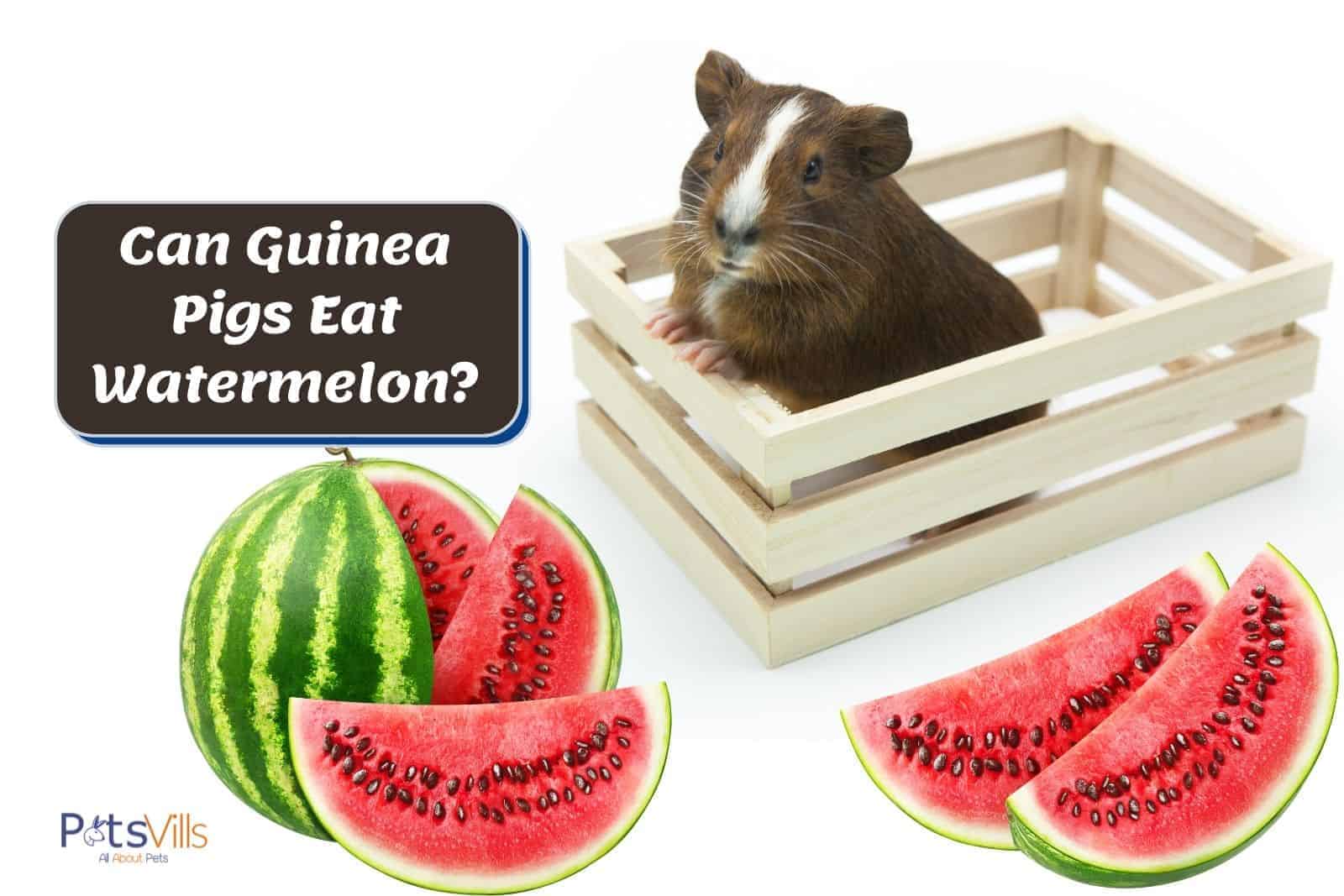Are you wondering, ‘Can guinea pigs eat watermelon?’ Surprisingly, yes – they can!
As an experienced guinea pig owner and diligent researcher, I’ve spent countless hours studying the best dietary options for our furry friends.- but it doesn’t stop here.
I’ll delve into the pros and cons of offering watermelon to guinea pigs, discussing the latest trends in science and what to look out for.
Keep reading to discover how to safely introduce this tasty fruit into their diet – and all the juicy bits...
Table of Contents
Key Takeaways
- Guinea pigs can safely eat watermelon, but it should be given as an occasional treat due to its high sugar content.
- Watermelon provides essential nutrients like vitamins A, C, and B6 and fiber and hydration for guinea pigs.
- The rind of the watermelon is safe for guinea pigs and offers additional nutritional benefits compared to the fruit’s flesh.
- To safely feed your guinea pig watermelon, remove all seeds, wash the fruit thoroughly, and serve at room temperature.
READ MORE: What Vegetables Can Guinea Pigs Eat?
Can Guinea Pigs Eat Watermelon?
As the summer is approaching and as you enrich your daily diet with watermelon keeping in mind the health benefits above, won’t it be a delightful treat to the eyes to see your lovely little pets munch on it too to keep you company?
But can guinea pigs eat watermelon?
Short answer? Yes. However, be careful not to feed it too much…
Let’s take a look at the nutrition content and more to understand how to SAFELY feed your cavy this tasty summer treat.
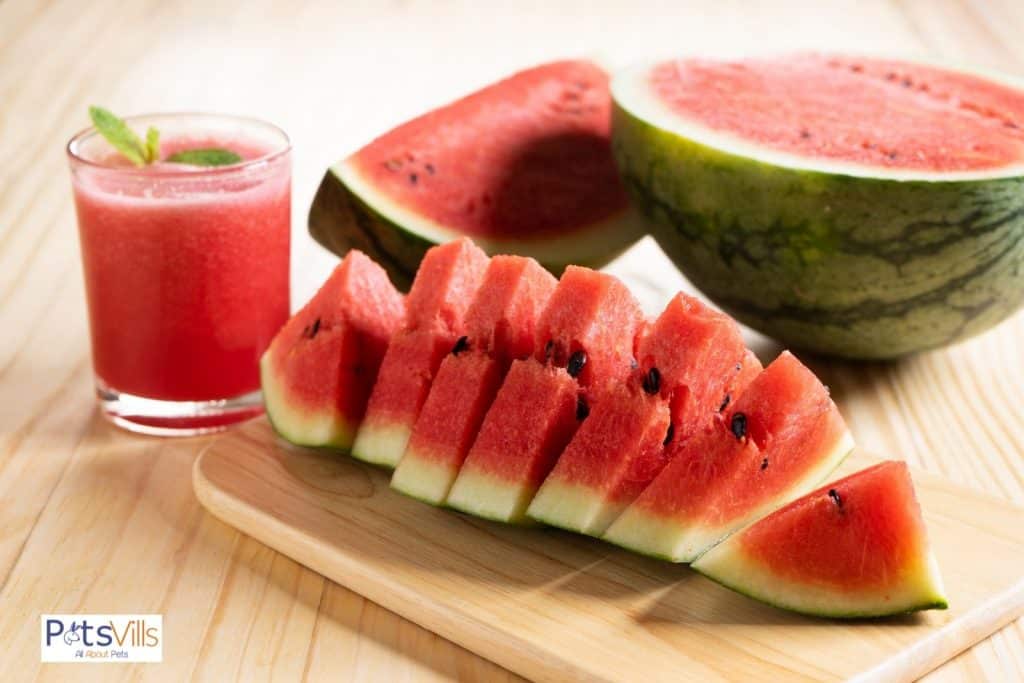
Nutritious Value
Watermelon is a rich source of Vitamin C, fiber, Vitamin A, Vitamin B6, Niacin, and Thiamine. Magnesium, Calcium, Potassium, and a variety of Carotenoids, according to the USDA [1][2][4].
| Nutrient | Value |
| Water (g) | 91.45 |
| Energy (kJ) | 127 |
| Protein (g) | 0.61 |
| Total lipid (g) | 0.15 |
| Ash (g) | 0.25 |
| Carbohydrate by difference (g) | 7.55 |
| Total fiber (g) | 0.4 |
| Sucrose (g) | 1.21 |
| Dextrose (g) | 1.58 |
| Fructose (g) | 3.36 |
| Maltose (g) | 0.06 |
Take a look at this cute video:
Is Watermelon Safe for Guinea Pigs?
Again, the short answer is yes…but with caveats.
With years of experience caring for guinea pigs, I’ve learned the importance of offering them a balanced and varied diet to ensure optimal health.
Let’s look at how to feed your cavy slices of watermelon safely.
Is it Healthy?
As with humans, watermelon has numerous health benefits for guinea pigs.
“Watermelon comprises 92% water, making it a great choice for daily water intake,” writes Registered Dietician and health expert Kerri-Ann Jennings, MS, RD [1].
It is not only a perfect source of hydration during the heat of the day but also provides other nutrients for a balanced diet, all of which are essential for the proper functioning of the body.
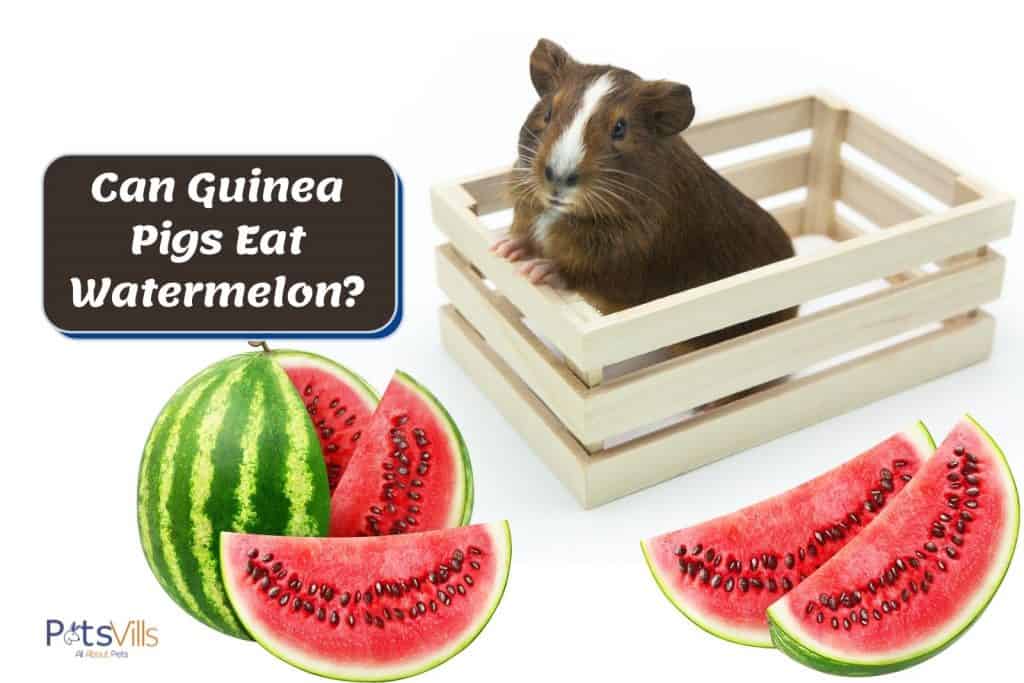
Some of the key benefits include:
- Antioxidant Properties: Watermelon is rich in antioxidants like lycopene and beta-carotene, which help protect guinea pigs’ cells from damage caused by free radicals. These antioxidants promote overall health and may reduce the risk of certain diseases.
- Immune System Support: Vitamin C in watermelon supports a strong immune system in guinea pigs, helping them fight off infections and maintain good health.
- Dental Health: Chewing on watermelon rind can help guinea pigs naturally wear down their ever-growing teeth, preventing dental issues.
Guinea pigs, like humans, cannot naturally synthesize Vitamin C, so they rely on their diet and supplements to acquire it.
Why’s that?
In guinea pigs, vitamin C is a potent antioxidant and is also required for collagen production, which is the main component of connective tissue and cartilage
The high amount of fiber in the fruit’s flesh and rind helps keep your guinea’s gut healthy – plus mobile…
Now, is the rind safe or not? Let’s find out…
Watermelon’s Rind – Safe or Not?
Based on my experience as a guinea pig owner and extensive research, I can confidently say that watermelon offers numerous health benefits for guinea pigs.
Can guinea pigs eat watermelon rind?
As a guinea owner with decades of experience, I will tell you a secret: While humans often discard watermelon rind, it’s a healthy treat that your guinea can eat…
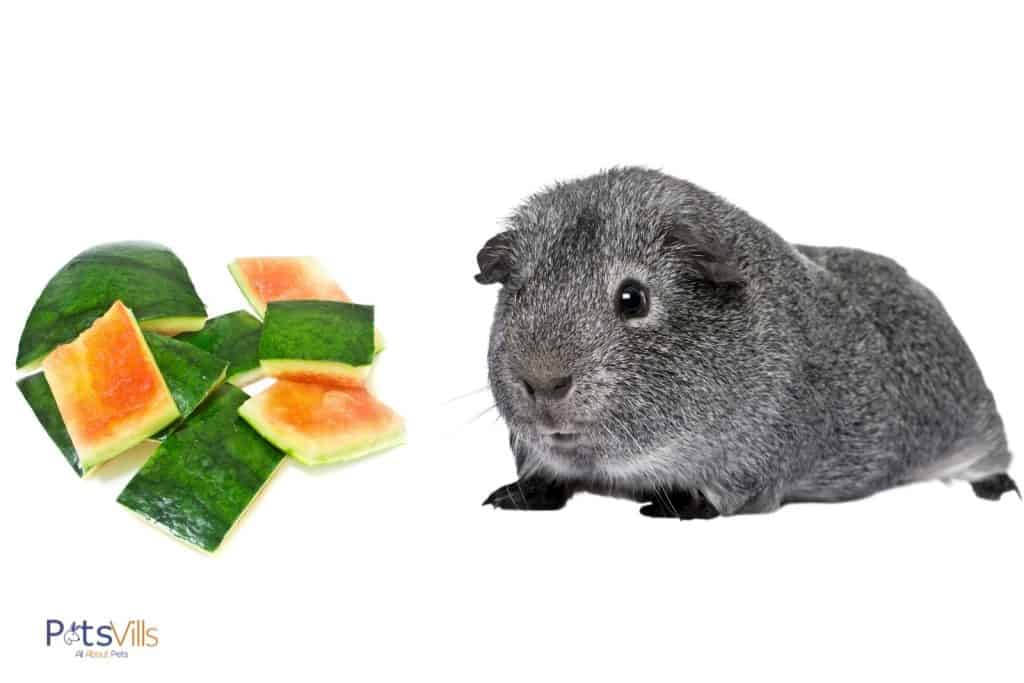
Surprisingly, cavies not only love to chew on it to chisel their teeth, but it also provides adequate amounts of fiber, Vitamin C, Vitamin B6, and Vitamin A.
I call that “Catching two birds with one stone.” You know what else?
The rind is low sugar content compared to the flesh, so there is less chance of that pesky sugar overload. (Yup, it’s a perk I love about this snack.)
Hooked already on watermelon? Here’s a video on the benefits of feeding watermelon to your piggy pets:
Before leaving too quickly, check out my guide: “Can Guinea Pigs Have Strawberries?”
How much watermelon can guinea pigs eat?
Guinea pigs have a delicate digestive system, and consuming too much sugar from watermelon can lead to health issues like obesity, upset stomach, bloating, and hyperglycemia.
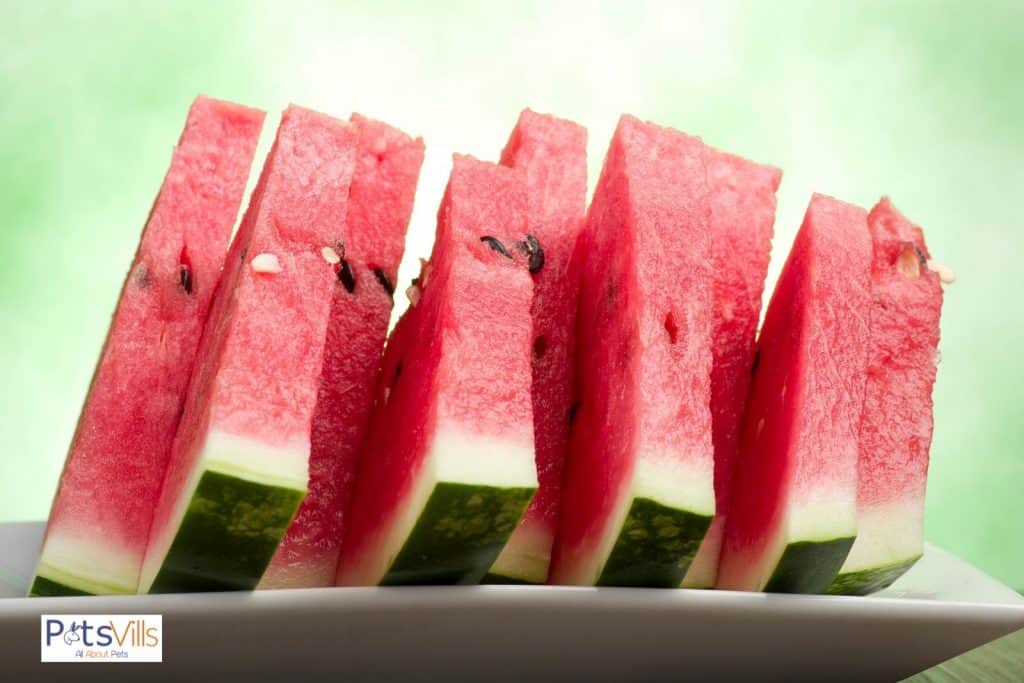
As a guinea pig owner, I’ve noticed the negative consequences of overfeeding this fruit to guinea pigs. Watch out for these signs:
Diarrhea, dehydration, electrolyte loss, and even altered consciousness in severe cases.
More so, over-feeding the rind can result in kidney and bladder stones, as well as urinary tract infections. It looks horrible: you’ll notice painful urination and blood in their urine.
Feeding your guinea pig watermelon strategically can help avoid these issues:
- Nutrient Imbalance: Overeating watermelon can disrupt a balanced diet.
- Competition for Food: Offering watermelon may cause aggression among guinea pigs.
- Overhydration: Excessive consumption could lead to overhydration.
- High Sugar Content: Watermelon, particularly the flesh, can contain too much sugar.
How to do this? To maintain a well-rounded diet, follow these guidelines:
- Serve watermelon in moderation: Offer a small slice (1-2 tablespoons) once or twice a week.
- Monitor sugar content: Be aware that watermelon has a high glycemic index and significant sugar content.
- Observe your guinea pig’s reaction: If they experience discomfort or diarrhea, reduce or eliminate watermelon servings.
Limit watermelon intake to a two-inch cube (rind included) no more than once or twice a week to provide a tasty, nutrient-rich treat while avoiding potential health risks.
Safety Measures When Feeding Watermelon to Guinea Pigs
Well yes! Being a nutrient-rich fruit with the additional quality of being a source of hydration, watermelon is safe for guinea pigs if specific safety measures are taken to prevent any mishaps.
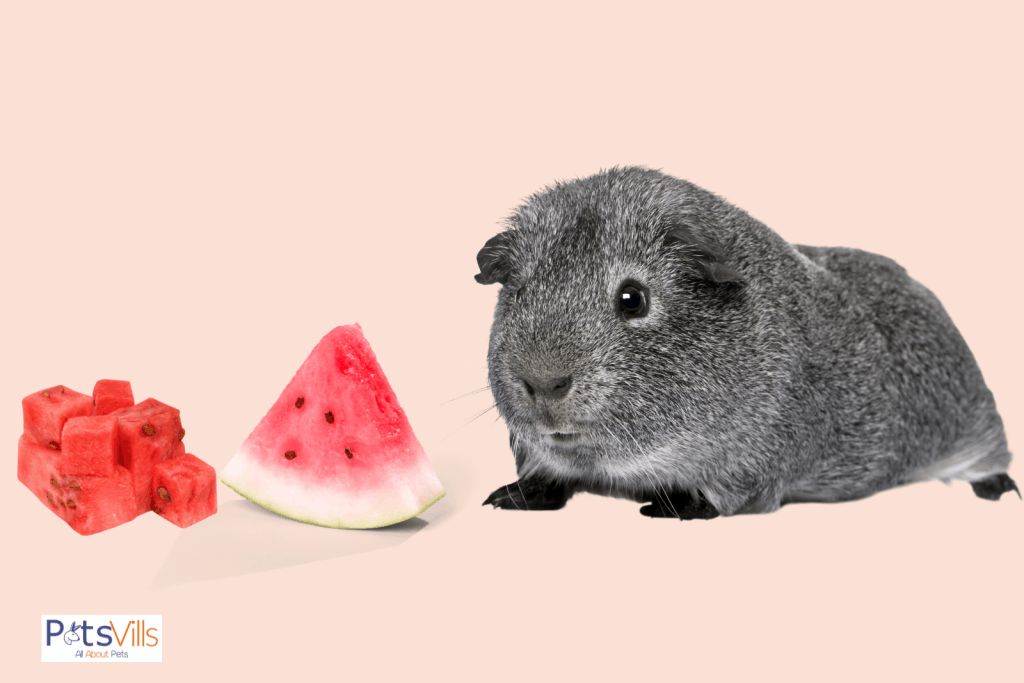
Remove the Seeds
What about the seeds? Where to find them?
Harry Paris, Ph.D., from the Agricultural Research Organization (ARO) Institute of Plant Sciences, explains that “In watermelons, the seeds are distributed within the fruit flesh but in melons the fruit flesh is free of seeds. [4]”
This means that, in watermelons, you’ll need to carefully inspect the fruit to remove all seeds before serving it to your guinea pig.
More specifically, inspect the watermelon and remove each seed before serving it to your guinea. This way, they’ll be safe from internal blockages and horrible choking hazards.
I always remove all seeds from this sweet treat to prevent choking hazards – and it works every time.
Wash Properly before Serving
Thoroughly wash the watermelon – both outer rind and flesh – to remove any wax, pesticides, or other chemicals on its surface.
If you hate washing them so much (as I do!) or are afraid of those harmful chemicals, opt for organic watermelons instead.
But – and here’s the million-dollar question – how do you find them? Amazingly, you can fetch them from your local organic farmer’s markets or local producers.
Just search around – you’ll never know what’s around the corner!
Monitor Temperature
So, what is the perfect temperature? To be safe, stick to room temperature!
Serving watermelon at room temperature helps prevent sudden temperature changes in the guinea pig’s digestive system, which could lead to discomfort or gastrointestinal issues.
Avoid Over-feeding
As explained earlier, offering your pet watermelon in excess can do more harm than good.
But don’t worry: If you feed it occasionally, you will keep your guinea’s interest – plus they will enjoy it even more.
“Less is more” sometimes – so avoid overindulging! As for good portion size, give them no more than a small piece of watermelon, about the size of your guinea pig’s head.
Besides watermelons, you can focus on other tasty fruits – grapes, apples, mangoes, raspberries, kiwis, oranges, pears, and plums – which will be tasty and form part of a healthy diet.
Look at this adorable guinea pig eating watermelon:
CHECK:
FAQS
Why do guinea pigs need an external source of vitamin C?
Guinea pigs, like humans, cannot produce vitamin C alone. They must consume it through diet or supplements to avoid a connective tissue disease called Scurvy.
What are the nutrients present in a watermelon?
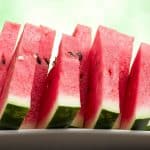
Watermelon is high in water content and contains nutrients like Vitamins A, C, and B6, Niacin, Thiamine, Magnesium, Calcium, Potassium, and Carotenoids.
What are the health benefits of watermelon?
Owing to the richness in nutrients mentioned before, it has various health benefits, for example, it aids in digestion, prevents the signs of aging, has anti-inflammatory properties, keeps the body hydrated, and helps to flush out toxins from the body through kidneys.
Is watermelon healthy for guinea pigs as well?
Watermelon provides several health benefits, such as aiding digestion, anti-inflammatory properties, hydration, detoxification, and preventing signs of aging.
What precautions should be taken when feeding watermelon to guinea pigs?
Watermelon should be washed, seeds removed to avoid choking, served at a proper temperature, and given in restricted amounts.
Is the rind of watermelon safe for guinea pigs to eat?
Yes, the rind is safe for guinea pigs to consume and is more nutritious than the flesh as it contains low glucose and high Vitamin C, B6, A, and fiber.
Why is it crucial to remove watermelon seeds before feeding them to guinea pigs?
Guinea pigs can choke on watermelon seeds while eating, leading to respiratory issues, which can be fatal. Therefore, it is essential to remove the seeds before serving.
Conclusion
So, can guinea pigs eat watermelon? In a nutshell, watermelon is a very nutritious and delicious fruit that is loaded with Vitamins and minerals for humans as well as guinea pigs.
Its primary content is water, which keeps the body well-hydrated during hot summers…
It’s also rich in Vitamin C, which is a primary requirement in a guinea pig’s diet as it is not produced naturally in its body.
It has numerous health benefits making it an ideal fruit snack to be introduced into the daily diet this season.
However, there are a few precautionary measures that must be taken while feeding it to your guinea pig to prevent its probable hazardous effects, as outlined above.
Make sure to only feed them seedless watermelons, and ensure the slice of watermelon isn’t too big. Or else they can choke!
So, before you head over to the beach on a hot summer day, drop a comment and tell me about your experiences…
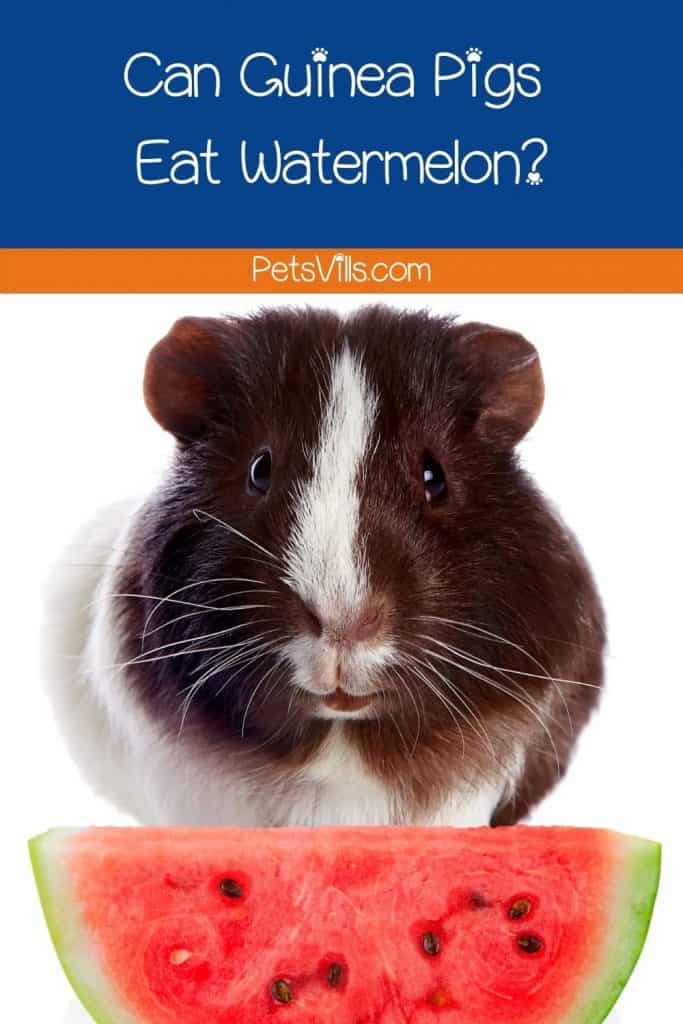
Can guinea pigs eat watermelon? What are your thoughts about it? Please share below!
References
1. Paris HS. Origin and emergence of the sweet dessert watermelon, Citrullus lanatus. Annals of Botany [Internet]. 2015;116:133–48. Available from: https://www.ncbi.nlm.nih.gov/pmc/articles/PMC4512189/
2. Richter A. Top 9 Health Benefits of Eating Watermelon [Internet]. Healthline. 2018 [cited 2023 Apr 29]. Available from: https://www.healthline.com/nutrition/watermelon-health-benefits#:~:text=Top%209%20Health%20Benefits%20of%20Eating%20Watermelon.%201
3. Bjornebo H. VITAMIN C RECOMMENDATIONS FOR GUINEA PIGS [Internet]. azeah.com. 2016. Available from: https://azeah.com/guinea-pigs/vitamin-c-recommendations-guinea-pigs
4. FoodData Central [Internet]. fdc.nal.usda.gov. Available from: https://fdc.nal.usda.gov/fdc-app.html#/food-details/167765/nutrients
Deanna is a passionate animal lover. She is the mom of several guinea pigs and sugar gliders.
When she’s not writing, Deanna loves listening to country music, or watching Dancing With The Stars.
Read her : Latest Articles
FIND HER ON: FACEBOOK and LINKEDIN and

